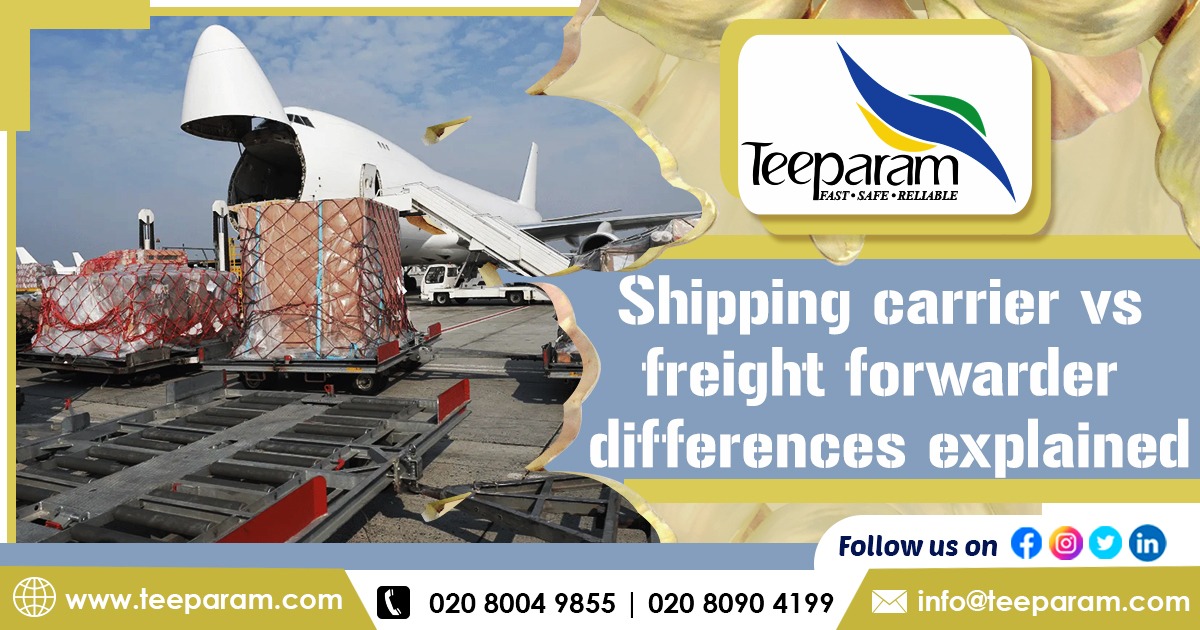If you’re running a business in the UK and dealing with logistics—whether it’s sending parcels across the country or exporting goods to Europe and beyond—you’ve likely heard the terms “shipping carrier” and “freight forwarder.” They both get your goods from A to B, but they’re not the same beast. Mixing them up can lead to costly mistakes, delays, or even a right mess with customs, especially post-Brexit. In this article, I’ll break down the differences in plain English, so you can make smart choices and keep your supply chain humming. We’ll cover what each does, how they differ, and when to pick one over the other. By the end, you’ll be clued up and ready to ship like a pro.
What’s a Shipping Carrier, Then?
Shipping carriers are the folks who physically move your goods. They own the lorries, ships, planes, or trains that do the heavy lifting. These are the companies that load your goods, drive or fly them, and drop them off at the destination.
Carriers are dead straightforward. You book with them—often online or via an app—get a quote based on weight, size, distance, and how fast you need it there. For instance, if you’re shipping a pallet of Welsh wool from Cardiff to Manchester, a carrier might quote you based on distance and service level (next-day, economy, etc.). You’ll get a tracking link to watch your shipment zip across the M6 in real-time, which is handy for keeping customers happy. Carriers might offer extras like insurance or short-term storage, but their focus is moving your stuff, not managing the red tape.
Freight Forwarders: The Logistics Wizards
Now, let’s talk about freight forwarders. These are the people who make complex shipping feel like a breeze. Instead, they’re like travel agents for your cargo, sorting out the entire journey from start to finish. They book the right carriers, handle paperwork, and deal with the nitty-gritty of international trade.
Say you’re exporting British-made gin to Germany. A forwarder will find the best route—maybe a lorry to Dover, a ferry to Calais, then rail to Berlin. They’ll book the carriers, consolidate your shipment with others to save costs (called Less Than Container Load or LCL), or secure a full container (FCL) for bigger loads. Their real superpower? Customs. Post-Brexit, shipping to the EU has become a minefield of forms—EORI numbers, commodity codes, VAT rules. A forwarder handles all that, plus duties and compliance, so you don’t end up with your goods stuck in Rotterdam.
I heard a cracking story from a mate who runs a small UK furniture business. He tried exporting to France without a forwarder and got stung with unexpected customs delays and fees. Switched to a forwarder, and it was smooth as butter—they even sorted out the phytosanitary certificates for wooden items. Forwarders also manage multi-modal transport (lorry to ship to train) and provide a single point of contact, sparing you from chasing multiple invoices.
Unlike carriers, forwarders don’t take ownership of your goods. They earn their keep through fees or commissions from the carriers they book. This makes them flexible, tailoring solutions whether you’re shipping artisanal biscuits to Japan or machinery to the States.
Breaking Down the Differences
Let’s put carriers and forwarders head-to-head to see how they stack up for UK businesses.
Ownership and Operation: Carriers own the vehicles—lorries, ships, planes. They’re hands-on, responsible for your goods while in transit. If a lorry breaks down on the M25, that’s on them. Forwarders? They own nothing but have a cracking network of carriers. They’re the brains, picking the best transport options and coordinating the lot.
Services Offered: Carriers stick to transport. They pick up, move, and deliver. Some providers offer tracking or basic insurance, but that’s about it. Forwarders are the full package—logistics planning, customs clearance, warehousing, even advice on Incoterms like DAP or DDP (critical for EU shipments post-Brexit). They’ll sort your Export Declaration or Certificate of Origin, saving you from HMRC headaches.
Cost Structure: Carriers charge based on clear metrics: weight, volume, distance. Sending a parcel from London to Edinburgh? You’ll get a quote based on weight, and distance. Forwarders might seem dearer with their fees, but they can save you dosh by consolidating shipments or avoiding customs penalties. For example, grouping your load with others in an LCL shipment to Spain could cut costs compared to booking a carrier directly.
Liability: Carriers are liable for loss or damage during their leg, governed by UK laws like the Carriage of Goods by Road Act. Forwarders’ liability depends on the contract—some offer full insurance, others limited. Always check the terms; a good forwarder will chase claims for you if a carrier messes up.
Scale and Complexity: Carriers are brilliant for simple jobs—think e-commerce parcels within the UK or straightforward EU runs. Forwarders shine in complex, international shipments, especially with Brexit adding layers of bureaucracy. If you’re exporting to non-EU markets like the US or Asia, a forwarder’s expertise in global regulations is a lifesaver.
Tech and Tools: Both use digital platforms, but forwarders often have fancier tech—think real-time quotes, AI-optimised routes, or blockchain for secure customs docs.
When to Pick One Over the Other
So, when do you go with a carrier? If you’re shipping domestically—say, from Bristol to Birmingham—or doing simple EU runs with minimal customs hassle, a carrier like Yodel or TNT is your mate. It’s cheaper, faster to book, and you’re in control. Pros: Direct pricing, quick setup, reliable for straightforward jobs. Cons: You’re on your own for paperwork or unexpected issues.
Choose a freight forwarder for international shipments or complex logistics. They’re worth their weight in gold for navigating Brexit rules, like the UK-EU Trade and Cooperation Agreement, or dealing with far-flung markets. Pros: Expertise, cost savings on scale, and end-to-end management. Cons: Extra fees, less direct control over transport.
Often, you’ll use both. Forwarders book carriers, so they work together. A UK SME might start with carriers for domestic e-commerce but turn to forwarders when exporting to new markets.
Tips for UK Businesses
Here’s the practical bit. For carriers:
- Pros: Reliable transport, transparent costs, great for UK or simple EU shipments.
- Cons: Limited support for customs or multi-modal trips, potential hidden fees if things go pear-shaped.
For forwarders:
- Pros: Handles Brexit and global red tape, optimizes costs, and manages the whole process.
- Cons: Fees can add up, relies on third-party carriers.
A few tips: Always vet your choice—check reviews on Google or ask for case studies. In 2025, with port congestion and EU trade quirks, reliability is everything. For small businesses, test carriers for domestic runs, but partner with a forwarder as soon as you go global.
Wrapping Up
To sum it up, shipping carriers are the muscle, moving your goods with precision. Freight forwarders are the masterminds, orchestrating complex logistics and tackling customs. For UK businesses, especially post-Brexit, choosing the right one depends on your needs—carriers for simple, domestic jobs; freight forwarders for international or tricky shipments. Get this right, and you’ll save time, money, and stress, keeping your customers chuffed. Got a shipping tale or question? Pop it in the comments—logistics is a wild ride!
In addition to freight forwarding, Teeparam offers international money transfer service and the exchange rates of Teeparam to Sri Lanka is competitive. So choose Teeparam to send money to Sri Lanka.



